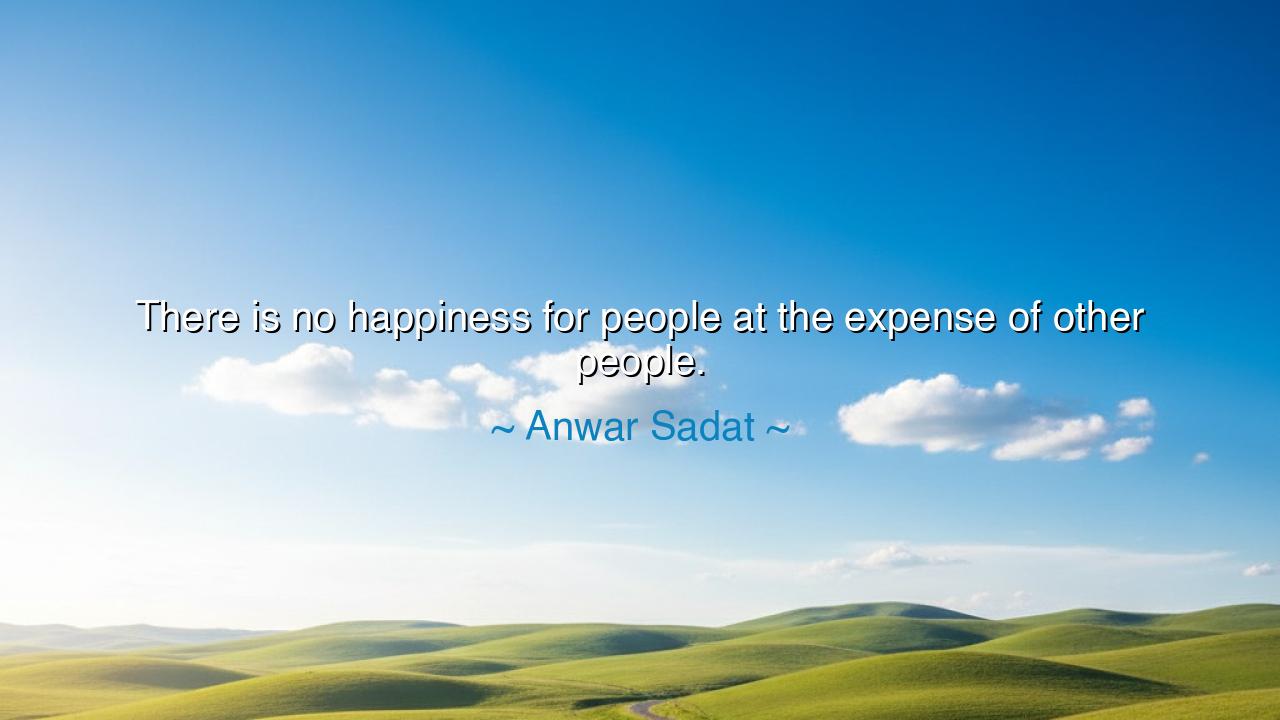
There is no happiness for people at the expense of other people.






“There is no happiness for people at the expense of other people.” Thus spoke Anwar Sadat, the Egyptian leader whose courage changed the course of nations. In this single sentence lies a truth that transcends borders and centuries — that happiness, when built upon the suffering of others, is no happiness at all, but a fragile illusion destined to crumble. These words were born not from philosophy alone, but from the hard soil of war and the deep longing for peace. They were the cry of a man who had seen both victory and grief, and who came to understand that no nation, no people, no human heart can find peace while another bleeds.
Sadat uttered this truth in a time of profound transformation, after decades of conflict between Egypt and Israel. He had once been a soldier and a patriot, but as a statesman, he saw that endless war turned triumph into tragedy. He realized that true prosperity cannot rise upon the ruins of another’s dream. When he journeyed to Jerusalem in 1977 — a gesture that astonished the world — he did not go to claim power or vengeance, but to prove that peace is the only path where both sides may walk without shame. In that act of courage, he gave living proof to his own words: that joy cannot bloom from domination, only from mutual respect and reconciliation.
In the spirit of the ancients, Sadat’s wisdom echoes the eternal laws of justice. The prophets, the philosophers, and the poets have all spoken of this — that the wellbeing of one soul is tied to the wellbeing of all. The Greeks called it dike, the harmony of justice that binds the cosmos together. The Buddha taught that to harm another is to harm oneself. Even in the sacred texts of Abraham’s children — the Torah, the Gospel, the Qur’an — the message is the same: no man may build his peace upon another’s tears. Sadat, in his wisdom, drew upon this timeless moral current, reminding modern humanity that progress without compassion is corruption of the heart.
Consider the tale of Nelson Mandela, who, like Sadat, emerged from prison not with hatred, but with vision. He could have sought revenge against those who oppressed him and his people, but instead, he chose forgiveness, knowing that the freedom of South Africa would mean nothing if it came through the chains of another. By rejecting bitterness, Mandela made his people free not only in body, but in spirit. So too did Sadat believe that Egypt’s future could not be secured by the suffering of Israel, nor could Israel’s safety come from Egypt’s humiliation. To him, happiness had to be shared — or it could not exist at all.
This wisdom stretches far beyond nations and wars. In every sphere of life — in families, in workplaces, in the hearts of individuals — the same law applies. When one seeks joy through domination, wealth through exploitation, or victory through deceit, what is gained is not peace but emptiness. The human spirit is not designed for selfish triumph; it yearns for connection. A happiness that excludes others turns quickly to dust, for it is built upon the shifting sands of injustice. Only when we lift one another can we rise ourselves.
And yet, the path of shared happiness is not easy. It demands courage, humility, and the strength to see humanity in those we call enemies. Sadat paid the ultimate price for this courage — he was slain by those who could not yet see that peace is stronger than pride. But his sacrifice became seed, and from it grew the fragile but enduring truth that hearts cannot be divided by borders forever. His legacy teaches that moral greatness is not in conquest, but in compassion.
So, let this be the lesson for all who live after him: if you would find happiness, seek it not by taking from others, but by giving to them. Do not measure your success by what you gain, but by how much peace you bring to the world around you. When envy whispers that your joy requires another’s fall, remember Sadat’s words — that no happiness exists at the expense of another. Build instead the happiness that includes, the peace that heals, the love that multiplies.
For only such happiness endures. It is the happiness of the just man, the wise woman, the nation that learns mercy, and the soul that knows unity. This is the happiness that does not fade when storms arise — for it is rooted not in selfish triumph, but in the eternal harmony of the human heart. And that, as Anwar Sadat knew, is the only happiness worthy of the name.






AAdministratorAdministrator
Welcome, honored guests. Please leave a comment, we will respond soon